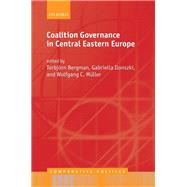Coalition Governance in Central Eastern Europe
, by Bergman, Torbjorn; Ilonszki, Gabriella; Muller, Wolfgang C.- ISBN: 9780198844372 | 0198844379
- Cover: Hardcover
- Copyright: 2/20/2020
Coalition government among different political parties is the way most European democracies are governed. Traditionally, the study of coalition politics has been focused on Western Europe. Coalition governance in Central Eastern Europe brings the study of the full coalition life-cycle to a region that has undergone tremendous political transformation, but which has not been studied from this perspective. The volume covers Bulgaria, Estonia, the Czech Republic, Latvia, Lithuania, Hungary, Poland, Romania, Slovakia, and Slovenia. It provides information and analyses of the coalition life-cycle, from pre-electoral alliances to coalition formation and portfolio distribution, governing in coalitions, the stages that eventually lead to government termination, and the electoral performance of coalition parties. In Central Eastern Europe, few single-party cabinets form and there have been only a few early elections. The evidence provided shows that coalition partners in the region write formal agreements (coalition agreements) to an extent that is similar to the patterns that we find in Western Europe, but also that they adhere less closely to these contracts. While the research on Western Europe tends to stress that coalition partners emphasize coalition compromise and mutual supervision, there is more evidence of 'ministerial government' by individual ministers and their parties. There are also some systems where coalition governance is heavily dominated by the prime minister. No previous study has covered the full coalition life-cycle in all of the ten countries with as much detail. Systematic information is presented in 10 figures and in more than one hundred tables.
Comparative Politics is a series for researchers, teachers, and students of political science that deals with contemporary government and politics. Global in scope, books in the series are characterised by a stress on comparative analysis and strong methodological rigour. The series is published in association with the European Consortium for Political Research. For more information visit: www.ecprnet.eu.
The series is edited by Emilie van Haute, Professor of Political Science, Universite libre de Bruxelles; Ferdinand Muller-Rommel, Director of the Center for the Study of Democracy, Leuphana University; and Susan Scarrow, John and Rebecca Moores Professor of Political Science, University of Houston.
Comparative Politics is a series for researchers, teachers, and students of political science that deals with contemporary government and politics. Global in scope, books in the series are characterised by a stress on comparative analysis and strong methodological rigour. The series is published in association with the European Consortium for Political Research. For more information visit: www.ecprnet.eu.
The series is edited by Emilie van Haute, Professor of Political Science, Universite libre de Bruxelles; Ferdinand Muller-Rommel, Director of the Center for the Study of Democracy, Leuphana University; and Susan Scarrow, John and Rebecca Moores Professor of Political Science, University of Houston.







